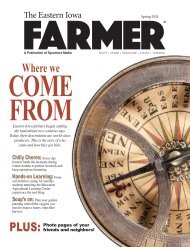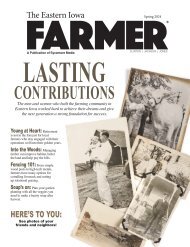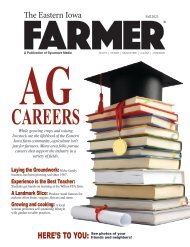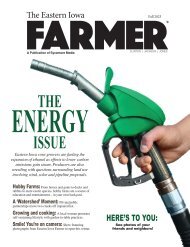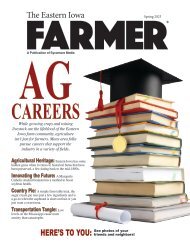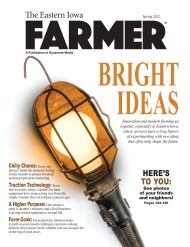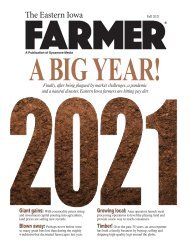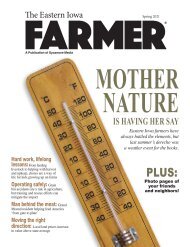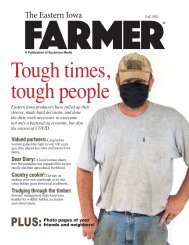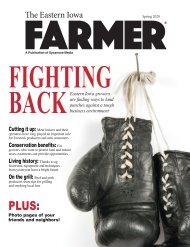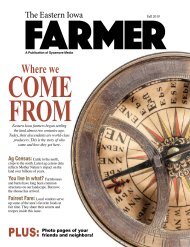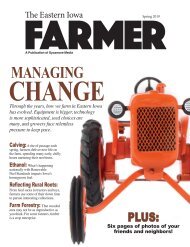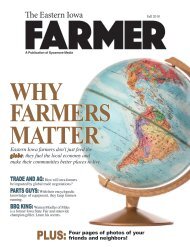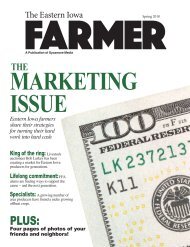Create successful ePaper yourself
Turn your PDF publications into a flip-book with our unique Google optimized e-Paper software.
BY JENNA STEVENS<br />
Ag in the Classroom<br />
Coordinator<br />
Clinton County Farm Bureau<br />
EASTERN IOWA FARMER<br />
Two percent. Two percent of an<br />
acre is 871.2 square feet. Two<br />
percent of the price of a 2022<br />
John Deere combine with a corn<br />
head is $18,650.50, and two percent is also<br />
the number of farmers and ranchers in the<br />
United States directly employed in producing<br />
our food, according to the American<br />
Farm Bureau Federation.<br />
Depending on which resource you want<br />
to believe, that number might even be<br />
lower. Producers are by far the smallest<br />
segment of the agricultural industry, and<br />
yet without them none of the rest of the<br />
agricultural sector would continue.<br />
Millions of people work in ag in positions<br />
juxtaposed to production, and yet<br />
many of them have never made a living<br />
farming.<br />
As technology increases, producers<br />
find themselves facing challenges never<br />
dreamed of in previous generations. While<br />
the internet makes it easy to market grain<br />
in an instant and troubleshoot problems<br />
from the cab of a tractor, the tradeoff is the<br />
need to play defense about the decisions<br />
and practices necessary to put food on our<br />
own tables.<br />
Production agriculture often finds itself<br />
at the center of controversy on social<br />
media and websites alike, making the<br />
public skeptical of what we do to produce<br />
the products that feed, fuel, and clothe<br />
consumers. This mistrust is powered by an<br />
online culture that allows critics to hide behind<br />
the anonymity of their tablet screens.<br />
It has become trendy to raise concerns,<br />
real or imagined, about everything from<br />
pollution to poultry production, calling into<br />
There’s a lot of power<br />
behind the 2%<br />
in U.S. agriculture<br />
EASTERN IOWA FARMER PHOTO / BROOKE TILL<br />
Megan Clark gave a TEDx talk about the<br />
misconceptions within animal agriculture in<br />
front of an urban audience in the Quad Cities.<br />
Clark, who graduated from Central DeWitt,<br />
studies agricultural communications at Iowa<br />
State University.<br />
question decisions that we as farmers have<br />
spent months thinking about, planning for,<br />
and with a leap of faith, finally taking.<br />
Farming is stressful, no one can deny<br />
that. Every decision comes with careful<br />
estimations.<br />
“If I stretch this note out longer, can I afford<br />
the payments on a new bale wrapper?<br />
What repairs am I looking at if I go with<br />
used options? Did planting an extra 500<br />
acres to beans this year make a difference<br />
on my bottom line or did I give up too<br />
many bushels that could have been corn?”<br />
Online criticism from environmental and<br />
animal welfare groups and people posting<br />
negative comments anonymously can make<br />
the conversation feel unbalanced and lead<br />
to frustration if you are producer.<br />
To combat this, we must leverage our<br />
voices across the same platforms that<br />
are being using by critics; but, instead of<br />
remaining anonymous, it is important that<br />
we be a face, a voice, someone willing and<br />
able to answer questions with facts rather<br />
than theory.<br />
An example of this is the TEDx Talk<br />
given by Central DeWitt student, Megan<br />
Clark. Clark was selected to speak about<br />
the topic of misconceptions within animal<br />
agriculture in front of an urban audience<br />
in the Quad Cities. Her talk, titled “What<br />
I wish you would ask me,” addresses misunderstandings<br />
in the show cattle industry<br />
and gives advice on how producers and<br />
consumers can work together to close the<br />
knowledge gap.<br />
Finding a way to share production<br />
practices with consumers is key in helping<br />
them develop an open mind when it comes<br />
to having conversations about where and<br />
how our food is produced. When these<br />
conversations take place face-to-face, it is<br />
easy to answer questions that arise in the<br />
natural flow of the discussion, but with<br />
online critics, a different approach must<br />
be taken. We as producers must meet them<br />
on the same social media platforms and<br />
websites where their comments take aim.<br />
Instead of playing defense, we must counter<br />
with a strong, fact-based offense, citing<br />
resources from credible sources along with<br />
telling our own stories.<br />
While two percent does not seem like<br />
much land in an acre or much of a down<br />
payment on that new John Deere, it is one<br />
hundred percent of the voices needed to<br />
counterbalance the negative information<br />
online. If we do not start telling our stories,<br />
people who have less than two percent<br />
knowledge of what we do will tell them<br />
for us.<br />
Megan Clark’s talk can be found on You-<br />
Tube under TEDx Youth Davenport with<br />
the title “What I wish you would ask me.”<br />
28 EASTERN IOWA FARMER | FALL 2022 eifarmer.com



